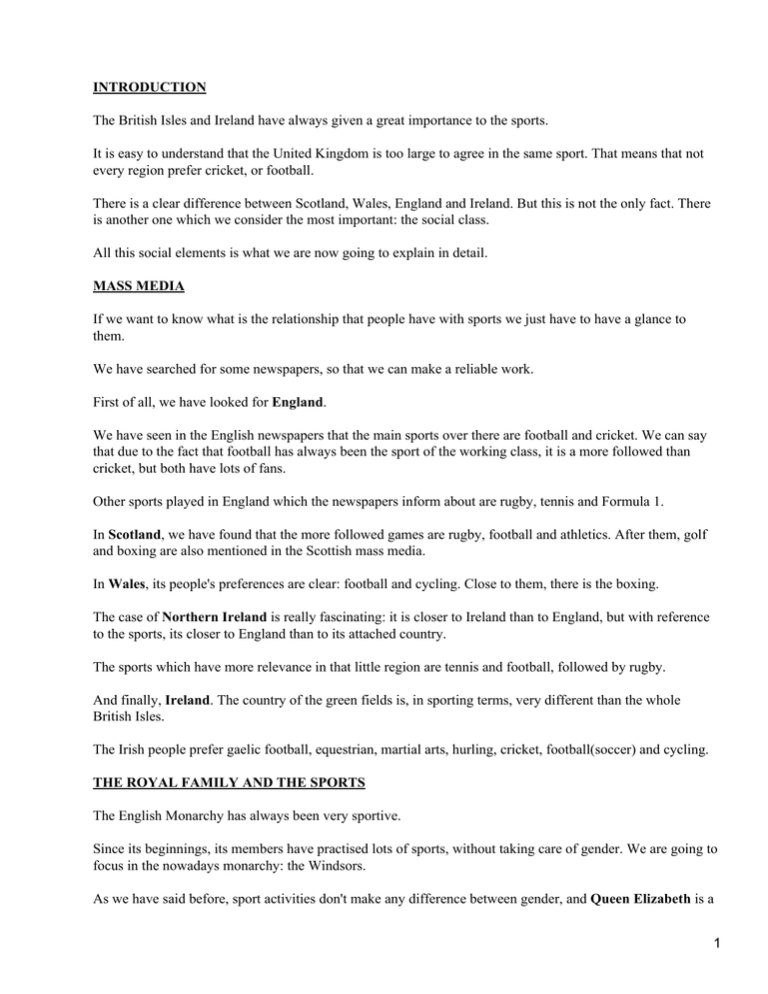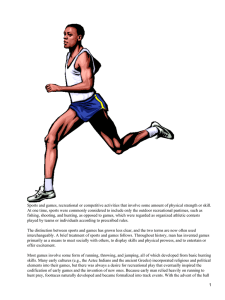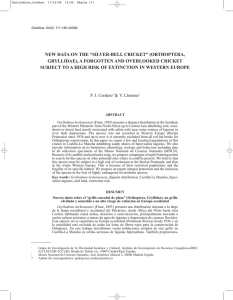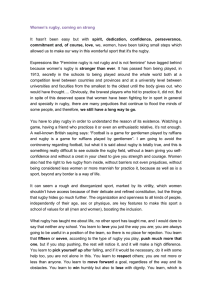Sports as a cultural manifestation
Anuncio

INTRODUCTION The British Isles and Ireland have always given a great importance to the sports. It is easy to understand that the United Kingdom is too large to agree in the same sport. That means that not every region prefer cricket, or football. There is a clear difference between Scotland, Wales, England and Ireland. But this is not the only fact. There is another one which we consider the most important: the social class. All this social elements is what we are now going to explain in detail. MASS MEDIA If we want to know what is the relationship that people have with sports we just have to have a glance to them. We have searched for some newspapers, so that we can make a reliable work. First of all, we have looked for England. We have seen in the English newspapers that the main sports over there are football and cricket. We can say that due to the fact that football has always been the sport of the working class, it is a more followed than cricket, but both have lots of fans. Other sports played in England which the newspapers inform about are rugby, tennis and Formula 1. In Scotland, we have found that the more followed games are rugby, football and athletics. After them, golf and boxing are also mentioned in the Scottish mass media. In Wales, its people's preferences are clear: football and cycling. Close to them, there is the boxing. The case of Northern Ireland is really fascinating: it is closer to Ireland than to England, but with reference to the sports, its closer to England than to its attached country. The sports which have more relevance in that little region are tennis and football, followed by rugby. And finally, Ireland. The country of the green fields is, in sporting terms, very different than the whole British Isles. The Irish people prefer gaelic football, equestrian, martial arts, hurling, cricket, football(soccer) and cycling. THE ROYAL FAMILY AND THE SPORTS The English Monarchy has always been very sportive. Since its beginnings, its members have practised lots of sports, without taking care of gender. We are going to focus in the nowadays monarchy: the Windsors. As we have said before, sport activities don't make any difference between gender, and Queen Elizabeth is a 1 clear proof of it. The present sovereign has always liked swimming, but if we have to remark the sport which she has enjoyed most, sure we can say riding: she is a keen horsewoman. Her husband, the Duke of Edinburgh, was in his youth captain of his teams of cricket and hockey. He also was a great fan of Polo. Prince Charles, their son, enjoys Polo the most. It was his father who showed it to him. The children that the Prince of Wales and Lady Diana Spencer had are, as their parents, very sportive. Prince William is maybe the member of the family that enjoy more sports. His favourite sports are football, rugby and tennis, but he also likes swimming, water polo and hockey. He has been captain of his teams of rugby and hockey, and he is an expert pigeon shooter. Prince Harry has followed the passion that his father and grandfather have: Polo. Last Summer he was seen for the first time playing this game with his father, in a charitable match in Beaufort Club, Gloucester. Now, I'm going to focus in one of the sports that we have mentioned before: cricket. Cricket is a team sport for two teams of eleven players each. A formal game can last anything from an afternoon to several days. But we will talk about the different types of cricket games later. Teams bat in successive innings and attempt to score runs, while the opposing team fields and attempts to bring an end to the batting team's innings. After each team has batted an equal number of innings, the team with the most runs wins. BEGINNING OF CRICKET The first pictorial evidence is an illustration of a man demonstrating a stroke with a stump to a boy holding a straight club and a ball in a Decretal of Pope Gregory IX that was illuminated in England; while in the Wardrobe Accounts of the Royal Household for the year 1300 the sums of 100 shillings and 6 pounds are mentioned as being spent on "creag" and other sports of Prince Edward. In the Tudor period there are references to boys playing "creckett" and in the seventeenth century there are many references that Oliver Cromwell played cricket in his youth. At the end of this century cricket makes its appearance in the newspapers, a trend that grows rapidly in the eighteenth century but is concerned with announcements of matches and, occasionally, they are more riots rather than descriptions of matches. CRICKET AROUND THE WORLD The International Cricket Council overseas all international cricket world−wide. They are currently: Australia, England, India, New Zealand, Pakistan, South Africa, Sri Lanka, West Indies and Zimbabwe. There are some associated countries, as well. In the case of Spain, they became associated in 1992. In the case of England, the National Game is divided into counties, which are: Durham, Essex, Derbyshire, Glamorgan, Gloucestershire, Hampshire, Kent, Lancashire, Leicestershire, Middlesex, Northamptonshire, Nottinghamshire, Surrey, Sussex, Warwickshire, Worcestershire and Yorkshire. 2 CULTURAL CURIOSITIES OF CRICKET + The most famous Test cricket Series is The Ashes, played every two years between Australia and England. The Ashes trophy is a small urn containing ``the ashes of English cricket'' (in reality the ashes of a set of bails), which ``died in a match in 1882 when Australia beat England for the first time. The Ashes are currently held by Australia, although the physical trophy is kept permanently in a room at Lord's Cricket Ground in London. The most infamous event in cricket was the 1932−33 English tour of Australia: the Bodyline tour. The English team used a new tactic to get batsmen out, by bowling at their legs. As the batsmen fended the ball away in an effort to protect themselves, the ball often flew off the edge of the bat into the waiting hands of the fielders, getting the batsman out caught. The English referred to this tactic as ``Leg Theory'', but the Australians, angry that the English bowlers were aiming at their bodies, christened it ``Bodyline''. Several Australian batsmen were seriously injured because of this. CONCLUSION In this work we have seen that sportive activities have a great importance in the British and Irish society. Even the Monarchy, which is considered an example to be followed, is a loyal fan of sport. We all know that practising it is a good way of improving health, but there is another dimension which is more complex. Sport is sometimes a way of remaining together in a certain cause, and we think that this is what people want nowadays, whenever they live. We all are too separate as to follow being separate; England has also suffered too much separation through the history, and maybe people want to stop it, to become more united. That's what we have understood of all the information that we have studied in detail. BIBLIOGRAPHY • www.cricket.org : November 2001 • www−usa12.cricket.org : November 2001 • www.cricket−online.org : November 2001 • www.cricketzone.com : November 2001 • www.lccc.co.uk : December 2001 • www.cricket.com : November 2001 • www.cricketworld.com : November 2001 • www.uk.sports.yahoo.com: January 2002 • www.theherald.co.uk: January 2002 • www.scotlandonsunday.com: January 2002 • www.belfasttelegraph.co.uk: January 2002 • www.royal.gov.uk: January 2002 • www.newswales.co.uk: January 2002 • www.utv.com: January 2002 3


